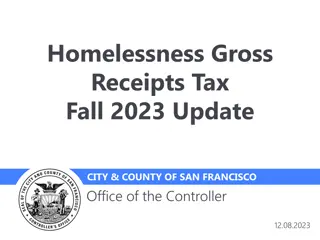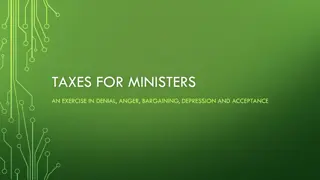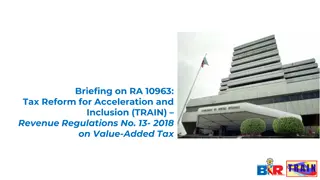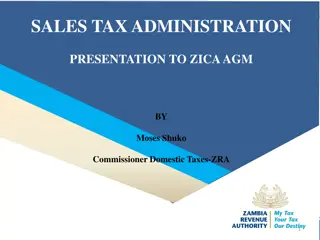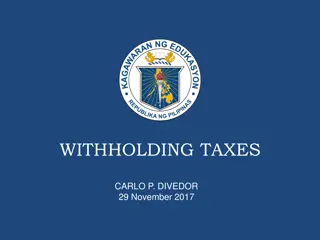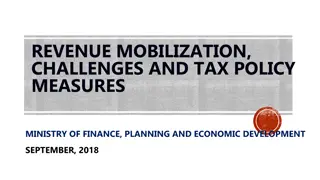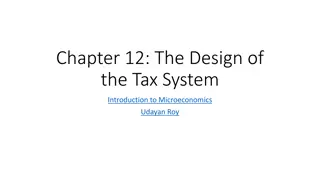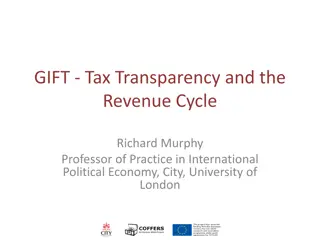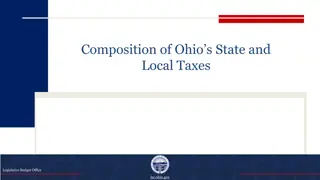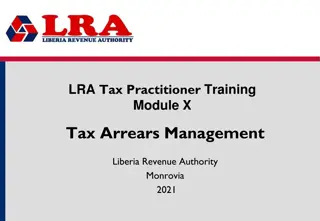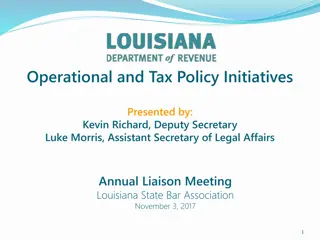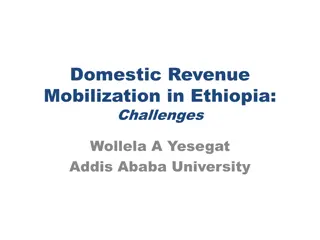Afghanistan Revenue Department Implements Value Added Tax
The Afghanistan Revenue Department has introduced Value Added Tax (VAT) as a step towards self-reliance and economic stability. The program aims to inform taxpayers about VAT, its purpose, implementation process, and impact on domestic revenues. By adopting VAT, Afghanistan aims to decrease reliance on foreign aid, boost domestic revenue, and enhance fiscal stability. The program also includes goals to improve taxpayer compliance and engagement.
Download Presentation

Please find below an Image/Link to download the presentation.
The content on the website is provided AS IS for your information and personal use only. It may not be sold, licensed, or shared on other websites without obtaining consent from the author.If you encounter any issues during the download, it is possible that the publisher has removed the file from their server.
You are allowed to download the files provided on this website for personal or commercial use, subject to the condition that they are used lawfully. All files are the property of their respective owners.
The content on the website is provided AS IS for your information and personal use only. It may not be sold, licensed, or shared on other websites without obtaining consent from the author.
E N D
Presentation Transcript
Ministry of Finance Customs and Revenue Department Afghanistan Revenue Department Value Added Tax Step Toward Self Reliance and Economic Value Added Tax Step Toward Self Reliance and Economic Stability Stability Effective Date: 22 DECEMBER 2021 Our Tax, Our Country, Our Future
Table of Contents 1.Introduction 2. Purpose of VAT Awareness Program 3. Background 4. What s VAT 5. Why VAT 6. Exemption and Zero-Rate 7. Registration 8. Documents of VAT 9. Refund 10.VAT Claim 11.The current tax situation in Afghanistan 12.Situation after VAT implementation 13.Supply chain 14.Taxpayers' rights and obligations 15.Q&A
Afghanistan's Domestic Revenue Sources Domestic Revenue Social Other Revenue Non Tax Revenue Sale of Government Custom Revenue Tax Contribution Revenue VAT Will Replace BRT Penalties and Tax Fines Fix Tax WWT Corporate Income Tax BRT
VAT Awareness Program Goals 1. Inform taxpayers regarding VAT implementation 2. Adopt the necessary preparations by companies 3. Involvement in the implementation process 4. Raise the level of compliance of taxpayers 5. Listening to taxpayers' opinions and suggestions
Background VAT was first introduced in Germany in 1918 and implemented in France in 1954 and later in Denmark. 1992 Pakistan, 2008 Iran,2019 in Uzbekistan and Turkmenistan The VAT rate in different countries is up to 27 percent Till now more than 160 countries implemented VAT
What is Value Added Tax? Value Added Tax Is an indirect tax imposed on a supply of taxable goods, services and imports; VAT is not a tax on the business It is a tax on final consumer. It replaces the BRT
Why to Implement VAT in Afghanistan? 1) Decrease in international aid year to year 2) More than 50 percent of Afghanistan's budget is financed by donors aid. That should be entirely from domestic Revenue. 3) By implementing VAT, Afghanistan enters into international protocols 4) VAT is a modern and Appropriate tax 5) By implementing this tax, Afghanistan will move towards fiscal and economic stability 6) Increase domestic revenues and reduce reliance on foreign aid
VAT in Afghanistan 1. A new tax for Afghanistan, 2. In order to impose this tax, a law, regulation, procedure, instructions and guidelines for value added tax have been prepared and approved. 3. The standard VAT rate is 10%, 4. Some goods and services are subject to zero- rate and exemption 5. The list of Zero-rated and exemptions are mentioned in VAT law.
Benefits of VAT Reduce the price of basic need items. Exemptions for goods and services related to Educational and Health sectors. Single Standard Norm. In contrast to BRT-VAT is imposed on the value added of goods, not on rotational capital. Input tax credit and refund Exports are subjected to zero rate.
Exempted Goods and Services Health services Educational services. Financial and insurance services. Transfer or lease of immovable properties for residential purposes. Provision of religious services. Humanitarian aids. Goods and services provided to a government entity for the purposes of rehabilitation after natural disasters, industrial incidents and catastrophes; Sport services. 1. 2. 3. 4. 5. 6. 7. 8.
Zero-Rated Good and Services Export of goods or services for use in outside the country. International land transport of goods or passengers including the supply of goods and related services. Transfer of part or whole of a business as a going concern by a registered person to another registered person, provided by a written agreement between parties and notified the Ministry of Finance. Some basic foods Items (wheat, flour, rice, sugar, cooking oil, tea, onions, potatoes, salt), Books and educational materials, Basic materials used for householdpurposes(coal, wood, gas, soap), 1. 2. 3. 4. 5. 6.
comparison of Standard rate, Zero rate and exemption Type of supply VAT Rate Output VAT Input VAT Standard Rate 10% Yes Yes Zero Rate 0% No Yes Exemptions No No No
Registration Registration Types Conditions Compulsory 1. The total value of taxable supplies made by the person in the past or upcoming 12 months be equal or more than VAT registration threshold (150 Millions Afs). 2. 510 Companies are eligible 3. A person registered shall remain registered for a period of at least one year from the date of registration. Optional 1. Turnover for optional registration is 100 million Afghanis. 2. Should offer taxable supplies. 3. At least 75% of the person s taxable supplies are to registered persons or at least 25% of the supplies are for export 4. Comply with tax laws and have an office for economic activity in the country. 5. Once registered, these individuals must remain registered for at least two years.
VAT Registration process Those who are eligible for VAT registration should submit an application for registration to Ministry of Finance within 15 days of becoming obliged to apply for registration. Persons who do not submit the registration application in the specified period without a valid reason obliged to pay a penalty for delay in registration. Also unregistered eligible persons will be registered compulsory by ARD in this case the payable VAT will be estimated and they will be subjected to additional taxes also.
VAT Registration Eligibility Conditions A person who carries on an economic activity shall be required to register for VAT with following conditions: The total value of taxable supplies made by the person in the past 12 months exceeds the VAT registration threshold. The total value of taxable supplies to be made by the person within the next 12 months is estimated to be more than the VAT registration threshold. Branches/agencies are accounted as single economic activity and will be registered by the name of taxpayer.
Calculation of Annual Supply Supplies of past 12 months will be obtained according to annual tax return from SIGTAS system. Supplies of next 12 months: Contracts Economic Transactions Goods in stock for the purpose of sell. Services which received from outside of country Supply of services which are planned Above mentioned evidence will be compared with SIGTAS and ASYCODA systems If necessary, more information will be obtained from the third party. And the physical existence of taxpayer office also will be ensured.
Registration of non-residents Whenever a non-resident without a fixed place in Afghanistan makes taxable supplies of goods and services exceeding the VAT registration threshold, he shall appoint his representative who is subject to the following conditions: Be a resident of Afghanistan with a tax identification number (TIN); have the power of attorney to represent the non-resident; have a fixed, known and accessible location; and have a good tax compliance track record.
Continue.. The representative is obliged to submit a registration application on behalf of a non-resident person. The representative is also obligated to fulfil other tax obligations of non-resident. The registration of a VAT representative shall be in the name of the person he represents. One can act on behalf of several non-residents.
VAT Certificate By completion of above mentioned conditions the VAT certificate of registration will be issued : 1. If there is a main place of activity and agencies for every branch, a duplicate copy of the certificate shall be issued with the same registration and TIN number with addition of the branches specifications. 2. The taxpayer is obliged to install the original registration certificate at the main place of activity which is included in the certificate and the duplicates in the branches as specified in the certificate, where it is visible. 3. If the previous provided information changes, it can be modified by submission of separate application request. 4. In case of opening a new branch of business, upon request, an additional VAT Reg. certificate will be issued. 5. Duplicate copy of the certificate will be issued upon request of taxpayer in case of loss or destruction. 6. Unauthorized use of the certificate is subject to tax penalties.
Cancellation of Registration A person who has lost the required registration conditions. An application for deregistration is compulsory and to be submitted within 15 days in the following conditions: The person ceased activities in the past twelve months period and there no possibility to start it in next 12 months. Application for exclusion of exempt supplies from tax registration The person can find the deregistration application form from ARD. The deregistration application must be submitted in approved form. A person whose registration is cancelled shall return to the Ministry of Finance all VAT registration certificates previously issued to him at the date of the cancellation
Documents of VAT VAT Registration Form VAT Registration Certificate VAT Invoices VAT Debit Note VAT Credit Note VAT Return Import Documents Export Documents
VAT collection from Via Over the General Directorate of Customs All importers Import of goods Afghanistan Revenue Department Registered persons for VAT Receive Specific Services Domestic sales of goods and services Afghanistan Revenue Department Registered persons for VAT
Input VAT Credit claim Only registered persons can claim for VAT tax paid on purchases and imports. In order to claim VAT input credit: Goods and Services must be subject to payable taxes. The taxpayer must have received the offerings and paid VAT for them. The taxpayer must have a VAT invoice for the purchases that show the taxpayer has paid VAT.
Refund Items Export of goods and services Use of goods which are subjected to standard-rate for production of zero rated items E.g.:-Use of chemicals (which is subjected to standard rate) for production of soap (which is subjected to Zero rate) Transportation of goods When sell price of goods is lower than purchase price. Overpayment of VAT
VAT Refund If input VAT for a period be greater than output VAT. The following actions are taken: The additional amount of tax is transferred to the next period. If this amount cannot be paid in full during the period, the remaining amount will be transferred to the next period. If the said amount is still not paid in full after the above- mentioned period, The remaining amount will be refunded by the Ministry of Finance within 45 days of submitting the request by taxpayer.
The current tax situation in Afghanistan Total revenue or sales 1000 -700 Cost of goods sold(CGS) Gross Profit 300 -100 Other expenses(Rent, Salaries ) -100 BRT 10% Net profit before income tax 100 20% income tax 20 Net profit after income tax 80
Situation after VAT implementation Total revenue or sales 1000 -700 Cost of goods sold(CGS) Gross Profit 300 -100 Other expenses(Rent, Salaries ) -0 BRT (10%) will be removed Net profit before income tax 200 20% income tax 40 Net profit after income tax 160
Supply chain Importer/ producer Wholesaler Retailer Consumer
12 Afn 10 Afn 2Afn 1 Afn 11-10 13-11 130 Afn 13 VAT 110 Afn 11 VAT 100 Afn 10 VAT
Distributer Retailer Wholesaler Consumer Importer Import Goods 100 VAT 10 Total 110 Goods 150 VAT 15 Total 165 Goods 140 VAT 14 Total 154 Goods 120 VAT 12 Total 132 Goods130 VAT 13 Total 143 Importer at Custom Importer Wholesaler Distributer Retailer Sum Output Tax 10 Afs 12Afs 13Afs 14Afs 15Afs Input Tax -0 Afs -10 Afs -12Afs -13Afs -14Afs Payed to Government 10 Afs 2 Afs 1Afs 1Afs 1Afs 15 Afs
Rights of Taxpayers 1. Receive Tax Forms 2. Receive technical assistance 3. Receive written information about the tax situation 4. Correction of the tax return 5. Introducing the representative 6. Receive an explanation regarding the documents collected by the tax office 7. The right to objection
Obligations of taxpayers 1. Obtain a TIN number 2. Provide information on changes to the any tax and business related 3. Provide accurate documents and information to the tax office on time 4. Accurate tax calculation 5. Maintenance of documents 6. Responsive during the Audit process or when necessary
For more information visit https://ard.gov.af/?s=pashto&c=tax-laws-ps
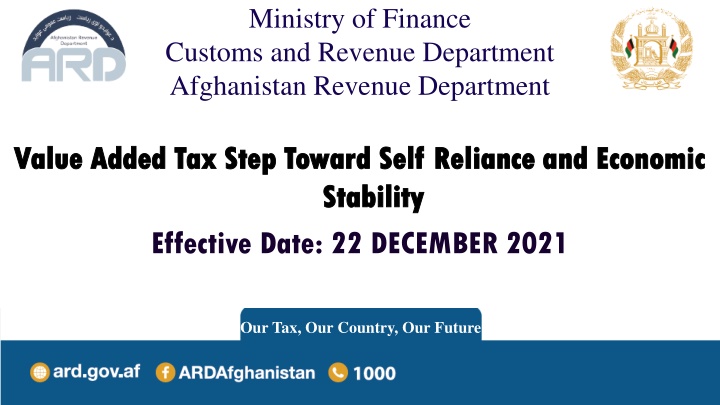

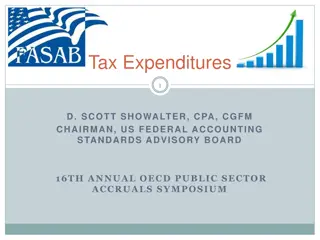
![Town of [Town Name] Real Estate Tax Rates and FY 2024 Budget Summary](/thumb/62211/town-of-town-name-real-estate-tax-rates-and-fy-2024-budget-summary.jpg)
